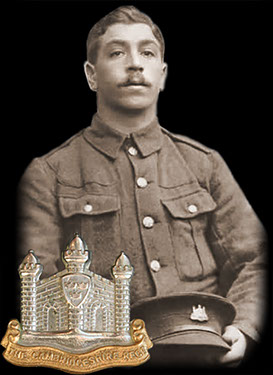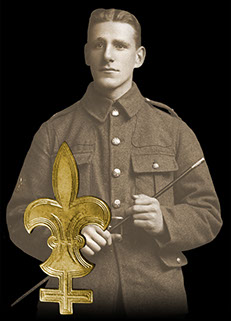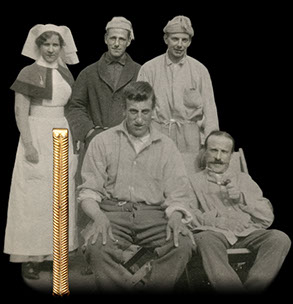Sickness and the Soldier
The cost of war can never be decided by combat casualties alone, for many soldiers succumbed to illness which either proved fatal or caused them to be no longer fit for active service.
Servicemen were routinely struck down by ailments that could easily have flared up had they been in civilian life, but other sickness was brought on by the conditions they endured while fighting on the Western Front. It was no different for men of the Cambridgeshire Regiment, which had about 60 personnel from its four battalions die from illness between 1914 and 1919.
Men of the regiment died of illness during every year of the war. Indeed the years of 1918 and 1919 were marked by the worldwide influenza epidemic that killed more people than the First World War. Soldiers of the regiment, both at home and abroad, were struck down by the virulent illness and it claimed a number of their lives.
But in 1914, the war was only in its early months when 23-year-old Private No. 1969 William Anderson, of Benwick, who was serving in G Company of 2/1st Battalion and based at the drill hall in Cambridge, died on November 30th 1914 of pneumonia and pleurisy at the city’s 1st Eastern General Hospital. Another 2/1st Battalion soldier, 21-year-old Pte No 1964, Arthur Sallabanks, coincidentally also of Benwick, died of a brain hemorrhage on February 4th 1915 while the battalion was based at Peterborough. Both soldiers are buried in Benwick cemetery. More information on Arthur can be found by clicking here.
Within a month of the 1/1st Battalion arriving on the Western Front in February 1915, the men’s health was severely tested under trench conditions and soldiers were being invalided home with various problems such as frost bite, typhoid, bronchitis, pneumonia, heart trouble, meningitis and nervous complaints. Some of these men eventually returned to front line activity after recuperation at home, but others could only manage home duty or were declared no longer fit enough for military service and discharged from the Army. Further information on those discharged on medical ground can be found by clicking here.
For some their health never recovered and was to have consequences in later life.
One such soldier was Arthur Leonard Oakey. Born in 1892 at Chatham in Kent, he was the son of Arthur Oakey and his wife Adelaide. Arthur senior, who was from Ely, Cambridgeshire, had enlisted in the Royal Marines in 1876 and reached the rank of Colour Sergeant in 1893, being discharged after 21 years’ service in 1897. The family moved to Marylebone in London before making their home in Ely in 1906, where Arthur senior died in 1911.
On moving to Ely, 14-year-old Arthur junior took a job as a solicitor’s clerk and in 1910 joined H (Ely) Company, 1st Btn Cambridgeshire Regiment, as Private No. 1081, becoming part of the cyclist section provided by H Company and also a trained scout. A volunteer for Imperial Service, he went to the Western Front with the battalion on February 14th 1915, in D Company, 16 Platoon (the new D Company had been formed from the pre-war G and H Companies).
By early May 1915, Arthur had been struck down by rheumatic fever and sent home on sick leave. On recovering sufficiently, he was posted to the 3/1st Battalion, which was based in England and provided reinforcements for the 1/1st Battalion serving on the Western Front. Arthur’s civilian occupation as a clerk no doubt helped him gain a post on the battalion’s clerical staff. He was never fit enough to resume overseas service and was eventually posted to the Labour Corps, where he reached the rank of Acting Company Sergeant-Major. In 1918 he married at Ely.
After his discharge from military service on March 21st 1919, he secured a job with the Ministry of Pensions, eventually becoming one of its enquiry agents in Kent.
Poor health was to strike again and 38-year-old Arthur died of tuberculosis and heart trouble as a result of war service on February 22nd 1930, at Preston Hall, at Aylesford, Kent, following an illness of several weeks’ duration. The hall had been a tuberculosis hospital for soldiers during the war, and was taken over by British Legion in 1926. His funeral was held at Holy Trinity Parish Church, Ely, and he is buried at Ely cemetery.

Pte Sallabanks of Benwick in late 1914.

Arthur Oakey before going to France.

Oakey (back middle) while recovering.

This site went live on the 14th February 2015 to mark 100 years since the 1/1st Cambs went off to war.
WE WILL REMEMBER THEM
Email us: cambsregt@gmail.com
Copyright 2015, 2016, 2017, 2018, 2019 by Felix Jackson. The information and images on this site should not be reproduced without prior permission.